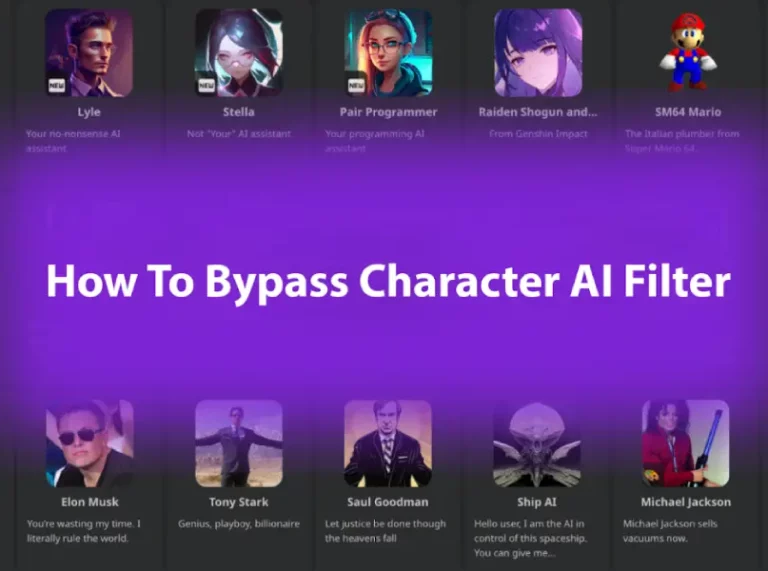AI Voice Generator: Revolutionizing Speech Synthesis
The emergence of AI voice generators has brought about a revolutionary shift in speech synthesis. These groundbreaking technologies employ artificial intelligence algorithms perfectly.
This is to convert written text into remarkably lifelike spoken words. AI voice generators capture the intricacies of human speech and offer a wide range of applications. They are transforming the landscape of communication, accessibility, and entertainment, as well as opening up unprecedented possibilities for natural and expressive audio experiences.
What Is An AI Voice Generator?
An AI voice generator utilizes artificial intelligence algorithms to synthesize human-like speech. It takes written text as input and generates spoken words with natural intonation, rhythm, and inflection. These systems employ deep learning techniques, such as RNNs or CNNs, trained on vast amounts of voice data.
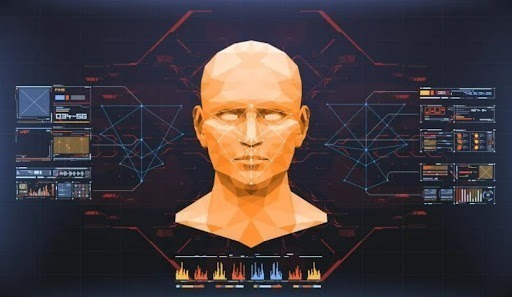
Voice assistants, virtual chatbots, audiobook narration, and more are AI voice-generator applications. They not only can adapt to different languages, accents, and emotions, but also provide versatile solutions for generating high-quality and natural-sounding speech.
AI voice offers accessibility solutions and transforms the entertainment industry. Responsible use and addressing ethical concerns are also essential in maximizing the benefits of AI voice generators.
How Does An AI Voice Generator Work?
An AI voice generator employs advanced algorithms and deep learning techniques. It synthesizes human-like speech from written text and leverages artificial intelligence to convert text inputs into natural-sounding spoken words.
Moreover, AI voice generators mimic the nuances and characteristics of human speech.
Training the model
To create an AI voice generator, a large amount of voice data is used for training the underlying model. This data consists of recordings of human speech, covering a wide range of linguistic variations, accents, and emotions.
The model can be based on recurrent neural networks (RNNs), convolutional neural networks (CNNs), or other deep learning architectures.
During training, the model will analyze the voice data and learn patterns in the audio signals. It captures information such as pronunciation, intonation, pitch, and rhythm, enabling it to generate speech that sounds natural and expressive.
Text-to-speech conversion
When a user inputs written text into this AI tool, the system first processes the text. It analyzes the linguistic elements, such as words, grammar, punctuation, and context, to understand the intended meaning and the appropriate way to vocalize it.
Generating speech
Once the text is processed, the AI voice generator employs the trained model to generate the corresponding speech. The model utilizes the learned patterns and linguistic features to synthesize the speech waveform. This waveform represents the audio signal of the generated speech, including the timing, pitch, and amplitude.
Post-processing and enhancement
After the speech waveform is generated, it undergoes post-processing and enhancement techniques to refine the quality and make it more natural.
This may involve filtering out the noise, adjusting pitch and intonation, and applying voice-specific characteristics based on the desired voice style or gender.
Output and delivery
Finally, the AI voice generators create and deliver a synthesized speech to the user. The output can be in various forms, such as an audio file, a real-time audio stream, or integrated into an application or device.
Read more: How To Make An AI Voice
How To Select The Best AI Voice Generator?
When selecting an AI voice generator, it’s crucial to consider factors such as voice quality, language support, customization options, and ethical considerations to ensure the choice that aligns with your specific requirements.
Understand requirements
Before choosing, it’s necessary to determine your specific needs and goals. Consider two following aspects:
- Intended use: Determine the purpose for which you require. Is it for creating voiceovers, chatbot interactions, virtual assistants, or other applications? Different generators may excel in specific use cases.
- Voice style: Consider the desired voice characteristics such as gender, age, accent, and tone. Some generators offer a wide range of voice options, while others may specialize in certain styles or languages.
Evaluate voice quality and naturalness
The quality and naturalness of the generated voices are essential factors to consider. Look for the following aspects:
- Realism: After listening to voice samples provided by the AI voice generator, please hear again the overall naturalness, realistic, pronunciation accuracy, and expressive qualities of the speech. The voices should sound human-like and free from unnatural artifacts.
- Intelligibility: Ensure that the generated speech is clear and easily understandable. Evaluate how well the generator handles complex text inputs, including punctuation, acronyms, and proper names.
Language support and accents
Some generators may support multiple languages and have a wide range of accents available, while others may be more limited. If you require specific languages or accents, ensure they are well-represented in the generator’s capabilities.
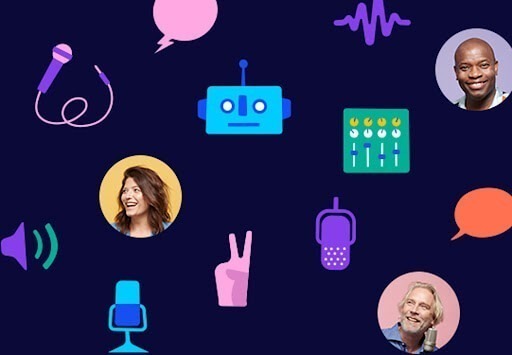
Customization and personalization
Customization options can help you achieve the desired tone and style for your application.
Check if the AI voice generator offers customization options to tailor the voice output to your specific needs. Look for features like control over pitch, speed, emphasis, and intonation.
Pricing and licensing
Evaluate the pricing model and licensing terms of the AI voice generator. Some generators may offer a pay-per-use or subscription-based model, while others may require a one-time purchase.
However, consider the costs involved and ensure that they align with your budget and usage requirements.
Developer support and integration
If you are a developer or plan to integrate AI voice into your applications, consider the level of developer support and the availability of APIs or SDKs.
Check if the generator provides comprehensive documentation, sample code, and a supportive developer community to assist with integration and troubleshooting.
User feedback and reviews
Research and gather user feedback and reviews about their experience. Look for testimonials from individuals or businesses who have used this technology for similar purposes to collect insights into the generator’s performance, reliability, and user satisfaction.
Ethical considerations
Take into account the ethical implications associated with the AI voice generator. Ensure that it adheres to ethical practices and data privacy standards.
Besides, please verify that the generator does not promote or involve the creation of harmful or deceptive content.
Trial and testing
Whenever possible, try out the AI voice experience yourself or take advantage of any trial options offered. Test the generator with your specific content inputs and evaluate its performance in terms of quality, naturalness, and meeting your requirements.
What Are Applications Of AI Voice Generators?
Applications of this AI tool are a wide range of industries and services, leveraging advanced speech synthesis technology to enhance user experiences by enabling interactive and engaging interactions.
- Virtual Assistants: AI voice generators power virtual assistants like Siri, Alexa, and Google Assistant, providing human-like voices for interactive and helpful experiences.
- Chatbots: AI voice generators enable chatbots to communicate with users through spoken responses, enhancing customer support and creating engaging conversational experiences.
- Audiobooks and Podcasts: They offering high-quality and diverse voices to bring stories and content to life.
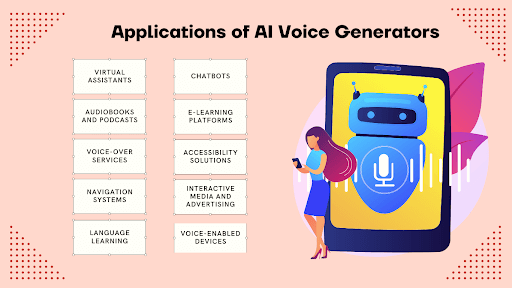
- E-learning platforms: These platform types enhance online education by providing narration for course materials, tutorials, and interactive learning experiences.
- Voice-over services: They involve the entertainment industry in voice-over services in movies, commercials, video games, and animations, providing versatile and customizable voices.
- Accessibility solutions: AI voice enables accessibility for individuals with visual impairments or reading difficulties by converting text into speech, making digital content more inclusive.
- Navigation systems: This system provides clear and accurate voice instructions for GPS navigation systems, enhancing user experience and safety while driving.
- Interactive media and advertising: This application offer dynamic and engaging voices for interactive advertisements, voice-enabled games, and interactive media experiences.
- Language learning: AI voice generators help language learners improve pronunciation and fluency by providing accurate and native-like speech models for practice and feedback.
- Voice-Enabled Devices: These devices are integrated into smart devices like smart speakers, smart TVs, and home automation systems, allowing users to control and interact with these devices through voice commands.
Read more: 4chan AI Voice Thread
How About The Benefits Of AI Voice Generators?
AI voice generator technology provides a range of benefits that enhance user experiences and streamline communication. From personal use to commercial applications, it offers numerous advantages that are transforming various industries.
Enhanced user experience
As we said in the sections above, this AI voice tool provides a more natural and engaging user experience. With advanced algorithms and machine learning, they can generate human-like voices that captivate and resonate with users, resulting in improved engagement and satisfaction.
Time and cost efficiency
Using AI technology significantly reduces the time and resources required to create voiceover content. Compared to traditional voice recording processes, which involve hiring voice actors, scheduling recording sessions, and post-production editing, with AI voice generators, these processes just waste a few minutes.
Multilingual capabilities
AI voice generators have the ability to generate speech in multiple languages and accents. This feature is invaluable for businesses operating in global markets or targeting diverse audiences.
Read more: How To Clone A Voice With AI
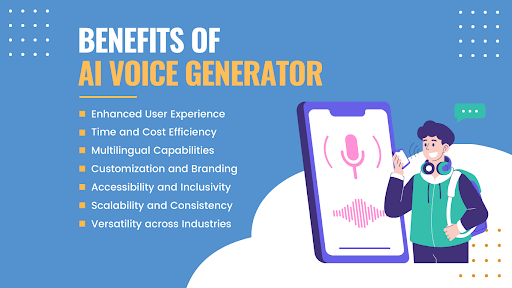
Customization and branding
AI voice generators offer customization options, allowing businesses to create unique voices that align with their brand identity. This level of personalization helps in establishing brand consistency and recognition, enhancing brand loyalty and customer engagement.
Scalability and consistency
They ensure consistency in voice output, regardless of the volume of content. They also can generate large volumes of audio content quickly and maintain a consistent voice, ensuring a seamless experience across various platforms and applications.
What Are Some Drawbacks Of AI Voice Generators?
While AI technology offers numerous benefits, it is essential to acknowledge the potential drawbacks and limitations that come with its usage.
Understanding these drawbacks can help in making informed decisions and addressing challenges associated with AI-generated voices.
Lack of emotional depth
One of the primary drawbacks of AI is the limited ability to convey complex emotions. While they can generate human-like voices, the nuances and subtle emotional expressions found in natural human speech may be lacking, leading to a less emotionally engaging experience.
Articulation and pronunciation errors
AI voice generators may occasionally struggle with accurate articulation and pronunciation, especially when dealing with complex or less common words, names, or specific accents. This can result in mispronunciations or unclear speech, affecting the overall quality and clarity of the overall voice.
Robotic or synthetic sound
Despite advancements in technology, AI may still carry a robotic or synthetic sound. While efforts have been made to improve naturalness, some voices may not fully replicate the richness and authenticity of human speech, which can impact the overall perception and engagement of users.
Limited voice variety
AI voice generators often have a limited range of available voices, with a smaller pool of diverse voices and accents compared to human voice actors. This limitation can restrict the ability to create unique and diverse character voices or cater to specific demographic preferences.
Ethical considerations
AI voice generators raise ethical considerations regarding the use of synthesized voices without explicit consent or permission from voice actors. The use of AI-generated voices in misleading or malicious ways, such as deep fake applications, poses ethical concerns and potential harm.
Conclusion
AI voice has emerged as a transformative tool, leveraging advanced algorithms to revolutionize speech synthesis. With their ability to convert written text into lifelike speech, they open up new possibilities in communication, accessibility, and entertainment.
This new technology is reshaping the overview of audio experiences, providing natural and expressive voices for diverse applications at the present and also for the future.
FAQ
- How much does Alaya AI cost?
As of April 2024, the pricing details for Alaya AI are not publicly available on their website. Interested businesses and individuals may need to contact Alaya AI directly for pricing information based on their specific requirements.
- What kind of information does Alaya AI provide?
Alaya AI provides a wide range of information, including: images, voice, text, video, etc.
- How does Alaya AI ensure privacy and security?
Alaya AI ensures privacy and security by using zero-knowledge encryption to protect user data and recording all interactions on a blockchain, aligning with strict privacy standards like GDPR.






